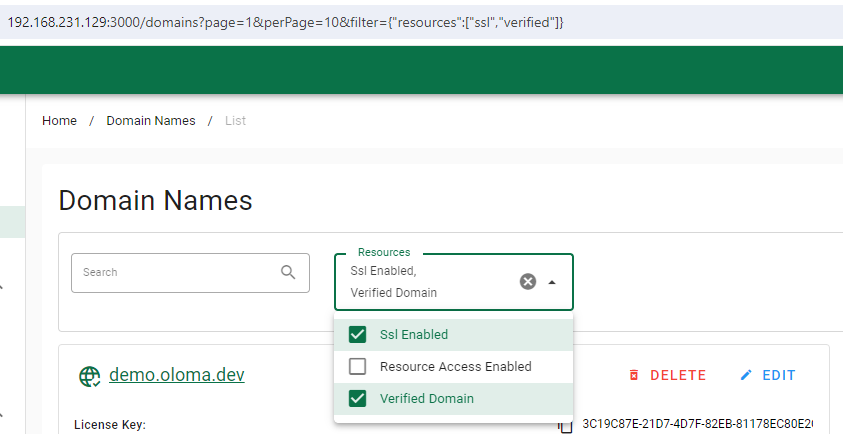Column Filters Api
This section lists all the methods in the column filters class in detail.
$columnFilters->clear()
Resets the values of variables belonging to the ColumnFilters class.
$columnFilters->setSelect(SqlInterface $select)
If filtering is performed between two dates, the $select object should be sent to the columnFilters class. Otherwise, filtering will not occur.
$this->columnFilters->setSelect($this->select);
$this->columnFilters->setDateFilter('creationDate');$columnFilters->setColumns(array $columns)
Determines which columns should be queried.
$this->columnFilters->setColumns(
[
'customerId',
'customerShortName',
]
);$columnFilters->unsetColumns(array $columns)
Deletes the columns that need to be queried.
$columnFilters->getColumns(): array
Returns the queried column names.
$columnFilters->setAlias(string $name, string $alias)
$this->columnFilters->setAlias('purchaserName', $this->concatFunction);You can also use Laminas\Db\Sql\Expression object as value.
$this->columnFilters->setAlias('orderItems', new Expression($this->orderItemFunction, [LANG_ID]));$columnFilters->setLikeColumns($columns)
It allows a like search to be performed within the columns you define.
$this->columnFilters->setLikeColumns(
[
'employeeNumber',
'name',
'surname',
]
);$columnFilters->setWhereColumns($columns)
It allows a where search to be performed within the columns you define.
$this->columnFilters->setWhereColumns(
[
'companyId',
'jobTitleId',
'gradeId',
'departmentId',
]
);$columnFilters->setGroupedColumns(string $name, array $columns, callable $returnFunc = null)
You will need this function when you convert filters, which usually have more than one boolean type and look messy, into a multi-selection input.

Considering the example above; Let's say you have 3 columns named ssl, verified and resourceAccess and we want to group these columns under a name that does not exist in your table.
$this->columnFilters->setGroupedColumns(
'resources', // group name
[
'ssl', // column names that you want to group
'verified',
'resourceAccess',
]
);Sql output:
SELECT
`d`.`domainId` AS `id`,
`d`.`name` AS `name`,
`d`.`url` AS `url`,
`d`.`ssl` AS `ssl`,
`d`.`verified` AS `verified`,
`d`.`resourceAccess` AS `resourceAccess`,
FROM
`domains` AS `d`
WHERE `ssl` = '1'
AND `verified` = '1'
AND `resourceAccess` = '1'If we had chosen to send a closure function from the 3rd parameter, the result would be as follows.
$this->columnFilters->setGroupedColumns(
'resources', // group name
[
'ssl', // column names that you want to group
'verified',
'resourceAccess',
],
function ($val) {
return (string)$val;
}
);Sql output:
SELECT
`d`.`domainId` AS `id`,
`d`.`name` AS `name`,
`d`.`url` AS `url`,
`d`.`ssl` AS `ssl`,
`d`.`verified` AS `verified`,
`d`.`resourceAccess` AS `resourceAccess`,
FROM
`domains` AS `d`
WHERE `ssl` = 'ssl'
AND `verified` = 'verified'
AND `resourceAccess` = 'resourceAccess'$columnFilters->getRawData(): array
Returns column data that was not processed by the column filter.
$columnFilters->setData(array $data)
It sends the incoming http data in array format to the column filter class.
$this->columnFilters->setData($get);$columnFilters->getData() : array
It returns incoming http data in array format.
$columnFilters->setDateFilter(string $dateColumn, $endDate = null, $fixedDate = null)
It automatically creates date filters based on the entered values.
Filter by a Single Column
Considering the example below, if the endDate value is sent empty,
$this->columnFilters->setSelect($this->select);
$this->columnFilters->setDateFilter('creationDate');This code produces a SQL query as follows.
/*
$nest = $this->select->where->nest();
$nest->and->between($dateColumn, $data[$columnStart], $data[$columnEnd]);
$nest->unnest();
*/Query Between Two Columns
If you only need to query between two specific database columns, the 2nd parameter makes the query occur between two dates and,
$this->columnFilters->setSelect($this->select);
$this->columnFilters->setDateFilter('startDate', 'endDate');The above code produces an SQL query as follows.
/*
$nest = $this->select->where->nest();
$nest->and->lessThanOrEqualTo($columnStart, $data[$endKey])
->and->greaterThanOrEqualTo($columnEnd, $data[$startKey]);
$nest->unnest();
*/Query Based on a Fixed Date
If fixedDate value is entered,
$this->columnFilters->setSelect($this->select);
$this->columnFilters->setDateFilter('startDate', 'endDate', 'startDate');This code produces an SQL query as follows.
/*
$nest = $this->select->where->nest();
$nest->and->lessThanOrEqualTo($columnStart, $data[$fixedDate])
->and->greaterThanOrEqualTo($columnEnd, $data[$fixedDate]);
$nest->unnest();
*/$columnFilters->getLikeData(): array
If a search request is sent by columns, the queried column names and values are returned.

print_r($this->columnFilters->getLikeData());
die;
/*
Array
(
[`firstname`] => demo
)
*/$columnFilters->getWhereData(): array
If a search request is sent by columns, the queried column names and values are returned.

print_r($this->columnFilters->getWhereData());
die;
/*
Array
(
[c.companyId] => Array
(
[0] => ebf6b935-5bd8-46c1-877b-9c758073f278
)
[j.jobTitleId] => Array
(
[0] => 137b00c8-0e36-ce3a-25f2-ce4b7b1cf97c
)
[g.gradeId] => Array
(
[0] => 8e9204c4-0133-4a51-82ca-4265b1656b1d
[1] => 07ef35ed-5f96-4776-a57a-998d5f09a891
)
)
*/$columnFilters->getOrderData() : array
Returns sorted column names and values.

print_r($this->columnFilters->getOrderData());
die;
/*
Array
(
[0] => j.jobTitleId ASC
[1] => name ASC
)
*/$columnFilters->getSearchData()
If search values are sent from the global search entry, the text search returns the column names and values.

print_r($this->columnFilters->getSearchData());
die;
/*
Array
(
[c.companyId] => Array
(
[0] => Brown
)
[`employeeNumber`] => Array
(
[0] => Brown
)
[`name`] => Array
(
[0] => Brown
)
[`surname`] => Array
(
[0] => Brown
)
[j.jobTitleId] => Array
(
[0] => Brown
)
[g.gradeId] => Array
(
[0] => Brown
)
)
*/$columnFilters->searchDataIsNotEmpty()
Returns true if the "global search" data is not empty, otherwise false.
$columnFilters->searchDataEmpty()
If the "global search" data is empty, it returns true, otherwise it returns false.
$columnFilters->likeDataIsNotEmpty()
If the "like" filter data is not empty, it returns true, otherwise it returns false.
$columnFilters->likeDataIsEmpty()
If the "like" filter data is empty, it returns true, otherwise it returns false.
$columnFilters->whereDataIsNotEmpty()
If the "where" filter data is not empty, it returns true, otherwise it returns false.
$columnFilters->whereDataIsEmpty()
If the "where" filter data is empty, it returns true, otherwise false.
$columnFilters->orderDataIsNotEmpty()
Returns true if the "sorting" data is not empty, otherwise false.
$columnFilters->orderDataIsEmpty()
If the "sorting" data is empty, it returns true, otherwise it returns false.